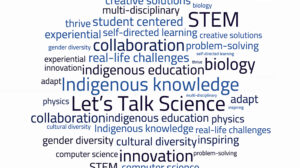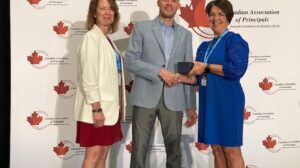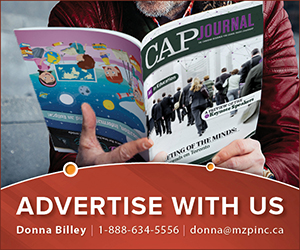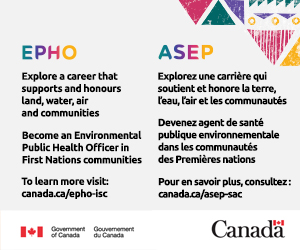Many elementary educators do not think of themselves as career educators. In fact, some may worry that career-related learning in elementary school aims to direct children towards specific employment pathways or occupations. However, a person’s career encompasses much more than simply their job—career is about life, learning, and work. One of the findings from our two-year study of career-related learning in grades 4 to 6 is that experienced elementary teachers view career as a holistic concept that is about more than paid work. A grade 6 teacher who participated in our research described career as:
“A life-long journey one takes filled with different education and work experiences; using and identifying different knowledge, skills and personal qualities and characteristics that make a positive contribution to the work one is doing and the community one is living in.”
Embracing career as a life-long venture encourages educators to view each life stage as an essential part of the journey. It also calls on educators working with young learners to consider their role and how best to support students as they begin this important journey and navigate the early stages of career-related learning and skill development.
In elementary school, students are developing an understanding of themselves in relation to the world and discovering passions, abilities, and interests. Through these endeavours and with the support of educators, they are also developing foundational skills that are useful everywhere in life and engaging in career-related learning. Cahill and Furey’s (2017) work on career education provides guidance on the goals of career-related learning in early schooling: “Career development for young children (preschool, primary, and early elementary) is about helping them in the here-and-now, the present, to develop a healthy sense of self and the competencies that will enable them to reach their full potential.”
As young learners mature and develop through childhood, it is important for educators broadly – but also school counsellors specifically – to foster and nurture the development of skills and competencies that will help each child find their path in life and maximize their chances of success. Different organizations have published lists of skills that are critical for life and career success1. A quick look at these lists demonstrates that elementary educators value, cultivate, and teach these skills in their classroom. For example, reading, writing, and numeracy are among the Government of Canada’s (2023) nine essential skills for success. These skills also form the foundation of much teaching and learning in elementary schools. Other career-related skills such as collaboration, problem solving, citizenship, and communication are valued by teachers, parents, and society as a whole. Thus, we see elementary educators nurturing and developing these skills through group projects, play, inquiry-based learning, presentations, fundraisers, and a host of other teaching and learning opportunities. Similarly, there is a growing emphasis on social and emotional learning for success in school and life (CASEL, 2016), which is reflected within not only the classroom but also curriculum and policy documents.
Our work researching career education taught us that grade 4 to 6 teachers do a wonderful job of teaching, assessing, and developing key life and career-related skills in their classrooms. However, we also found that students in this age group have a narrow definition of career, which is hampered by a lack of awareness about the different ways that people can contribute meaningfully to their community. While experienced educators view career as a life journey, elementary students equate career with specific jobs. These differences in perspective (and life experience) highlight two important realizations and areas for potential teaching and learning. First, students at this age and stage of life are not aware of the myriad job options, life paths, and opportunities that exist. Second, other meaningful aspects of career, such as volunteering, social justice advocacy, caring for others, and education, are absent from their concept of career. These insights further emphasize the importance of career-related learning within elementary education. Along with parents and members of the community, educators can help students develop a foundational and holistic understanding of career through intentional teaching, learning, and assessment practices that incorporate a variety of educator- and student-directed experiences and draw meaningful connections to the real world.
To help educators be intentional in linking the great work they are already doing in their classrooms to holistic concepts of career, we created a toolkit to support career-related learning and skill development in grades 4 to 6. Inside this toolkit – called Exploring Possibilities and available through national career development charity CERIC – we provide expert-developed teaching, learning, and assessment activities that will enhance students’ skill development and allow them to expand their thinking about their future. Example activities include co-creating definitions of skills with students, self-assessment tools, inquiry-based projects, focus months, and goal-setting activities. Each activity is fully described and required resources (e.g., blackline masters) are included. While we wanted to provide elementary teachers and counsellors with activities that are ready to go, we also recognize that teachers know their students best and, so, each activity can be easily modified to fit the diverse needs of students and various teaching contexts. The goal of the toolkit is to provide elementary educators with great ideas and starting points for developing skills and career-related knowledge in their classrooms.
As former teachers and current instructors in teacher education programs, we know that elementary educators go into the profession to help students realize their potential and achieve their dreams. Career-related learning is not about preparing students for specific jobs, it is about helping students discover their own abilities, passions, and interests and equipping them with the knowledge, skills, and opportunities for success across the lifespan. As some of children’s earliest supports and advocates, elementary educators play a pivotal role in student’s early career development. By embracing the role of career educator, it is our hope that elementary educators will see the countless ways they support career-related learning and skill development in their work with students and begin to imagine possibilities for future practice.
1 E.g., Skills for Success by the Government of Canada, Key Competences for Lifelong Learning by the European Union, or SkillsUSA at skillsusa.org
ABOUT THE AUTHORS:
Lorraine Godden PhD is a Senior Partner of Ironwood Consulting and a Faculty Lead in Yorkville University’s Educational Master’s program.
Nicki Moore is a Senior Lecturer in Career Development at the International Centre for Guidance Studies at the University of Derby in the UK where she leads the Centre’s programme of continuing professional development.
Heather Nesbitt PhD is an educator, researcher, and mother. She is an Adjunct Assistant Professor in the Faculty of Education at Queen’s University and an Instructor in the School of Education at Trent University.
Stefan Merchant PhD is the founder of SM Research and an Assistant Adjunct Professor at Queen’s University.
References:
Cahill, M., & Furey, E. (2017). The early years career development for young children: A guide for educators. CERIC. https://ceric.ca/publications/the-early-years-career-development-for-young-children-a-guide-for-educators/
CASEL. (2016). Why social and emotional learning and employability skills should be prioritized in education. https://www.cfchildren.org/wp-content/uploads/policy-advocacy/sel-employability-brief.pdf Government of Canada. (2023). Learn about the skills.https://www.canada.ca/en/services/jobs/training/initiatives/skills-success/understanding-individuals.html











